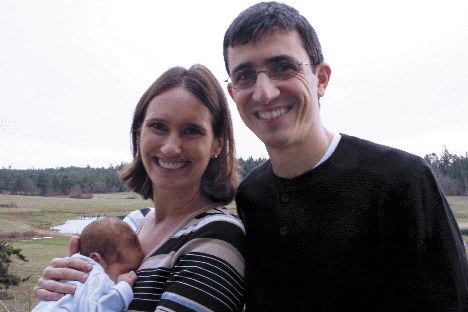Lucas Zakhour, the grandchild of North Whidbey Fire and Rescue Chief Marv Koorn, experienced a harrowing first month of his life.
Born in Haiti to Koorn’s daughter, Trisha, and her husband, Tarek Zakhour, on Dec. 30, 2009, Lucas’ first two weeks were just like that of any newborn, until Jan. 12 when a 7.0 magnitude earthquake struck the island nation.
The shaking began while Tarek was in the back office of a grocery store he manages for his uncle. He ran to the nearest doorway as everything on the shelves fell to the floor and parts of the building collapsed. Two of his co-workers were also inside and screamed as the structure shook.
The monster quake lasted for 15 to 17 seconds, Tarek said, recalling that it started lightly and slowly grew in intensity.
By Tarek’s estimate, he ran over the toppled merchandise and out of the crumbling building in less than a minute. His coworkers also escaped.
“God got me out,” he said.
Meanwhile Trisha and baby Lucas were at home with Tarek’s sister and two friends in Petionville, about 10 miles from the quake’s epicenter. The family lives in a first floor unit of a six-story building.
“We all looked at each other and expected it to stop,” Trisha said. “There was no place for cover, so we tried running out of the house but all the gates were locked and I didn’t have my keys,” she said. Eventually a neighbor arrived with keys in hand and unlocked the security gates.
“Looking back on it, we were really lucky,” she said.
Immediately after the quake, all forms of long-distance communication were unsuccessful.
Cellphone coverage and Internet connections were initially down, then spotty, Tarek said. The ground lines also failed, but then again, they’re never reliable on a regular basis, he said.
“The first few days were a little stressful,” Tarek said.
“When you go through a 7.0 the others aren’t that bad,” he joked of the numerous aftershocks that ranged from 4 to 6.1 in magnitude, according to reports from the United States Geological Survey.
Tarek and Trisha stayed with family nearby.
Everyone selpt outside the first night for fear of a more aftershocks that might topple more buildings. The following nights, they slept on the porch so they could evacuate quickly if another quake struck.
“Lucas slept in our arms or on our chest so we could get him out quickly if needed,” Trisha said. “It was a tough couple of weeks for him.”
Trisha eventually communicated with her stateside family through the social networking site, Facebook.
Initially the streets were clogged with people who didn’t have homes to go to, Tarek said. They’d walk up and down the road and search through rubble looking for family.
“It looked like a war zone,” he said as he flipped through a recent issue of People Magazine for an image of downtown, an area he was able to recognize from familiar store signs protruding from a collapsed building.
Tarek lost three extended family members to the Jan. 12 quake.
The couple immediately contacted the U.S. Embassy to arrange a flight out of the country. The process was slow, but the young family eventually arrived in Seattle late last Thursday, 10 days after the quake.
In two weeks Tarek will return to Haiti to help with the relief effort. He’s able to translate French, Creole, English and Arabic to help aid officials communicate with quake victims.
“If there’s anything I can do, I’ll do it,” he said.
The transition from Haiti to the Pacific Northwest hasn’t been easy for Tarek, who grew up in Haiti. There’s only a three-hour difference between Haitian and American time, but the Pacific Northwest winter weather is quite different from Haiti’s 80-degree January average.
“Our first stop was at Wal-Mart for a pair of gloves and a hat for Tarek,” Trisha said.
Trisha and Lucas will stay in Oak Harbor until it’s safe to return home.
Tarek’s immediate and extended family members report that some banks have re-opened and a few markets are selling whatever merchandise is left on the shelves; however, most distribution centers were damaged during the quake and are unable to make any shipments to re-stock the mostly barren shelves.
Trisha has lived an Haiti for 10 years and is currently on leave from her job as a teacher at Quisqueya Christian School in Port au Prince. The K-12 school is one of the few to withstand the disaster and is now in use as a disaster relief coordination center.


